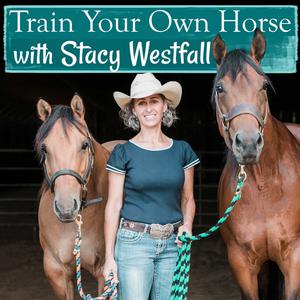
Train Your Own Horse with Stacy Westfall
Stacy Westfall
- 21 minutes 9 secondsEpisode 321: The Missing Step: Why Your Goals Need a Theme8 January 2025, 8:00 am
- 25 minutes 9 secondsEpisode 320: Your Next Chapter: Finding Magic in Your Own Timeline
In this episode, Stacy explores how a fresh perspective on learning can transform your horsemanship journey. Through sharing her own mindset shift about future learning goals, she demonstrates how being specific with timeframes while staying open to possibilities can create powerful growth opportunities.
Key takeaways:
- Learn why comparing your current learning to a previous period of growth can be motivating rather than intimidating
- Discover how slowing down to notice more layers can actually accelerate progress
- Challenge common misconceptions about what "learning more" means
Listeners will walk away understanding that growth isn't about rushing forward or making dramatic changes, but rather about deepening understanding. Whether you're a beginner or experienced rider, this episode provides practical insights about goal setting, the importance of staying curious, and permission to explore your horsemanship journey with both the enthusiasm of a newcomer and the wisdom you already possess.
1 January 2025, 8:00 am - 16 minutes 34 secondsEpisode 319-The Gift of Seeing: Finding Magic in the Rewatch
"If I could snap my fingers and give you a gift...” In this episode, Stacy shares what she considers one of the most powerful tools in any rider's journey. Drawing insights from the fascinating way children naturally approach familiar content, this episode reveals how riders can turn video from an overwhelming experience into a journey of discovery.
Through practical tips and encouraging insights, Stacy breaks down the three stages riders typically move through and offers guidance for each phase. Whether listeners are still avoiding the camera or ready to deepen their understanding, this episode offers a fresh perspective on video review that could make 2025 their most insightful year of riding yet.
25 December 2024, 8:00 am - 19 minutes 19 secondsEpisode 318-Noticing Progress While Embracing Reality
In this episode, Stacy explores why celebrating small wins matters, even - and especially - when faced with unexpected emotions about our progress. Through two student examples, she shows how awareness of subtle changes and acceptance of our journey's ups and downs leads to deeper understanding and growth.
She shares her personal journey with the concept of "life is 50/50," from initial skepticism to discovering its transformative power in horse training. This mindset shift helps explain why resisting challenges actually magnifies them, while accepting both progress and setbacks creates space to notice the small wins we might otherwise miss.
Listeners will learn how embracing both sides of progress - the expected and unexpected - leads to more sustainable progress.
18 December 2024, 8:00 am - 14 minutes 56 secondsEpisode 317: Your Horse's Year in Review: Seeing 2024 Through Their Eyes
In this episode, Stacy guides listeners through creating a year-end review from their horse's perspective. Building on her popular approach of sharing stories from the horse's viewpoint, she offers:
- Two ways to participate: follow along with the podcast or download a free interactive PDF workbook (click here to go to the page with the pdf)
- Examples from Enzo and Ember that demonstrate how to capture your horse's personality
- Creative prompts to help identify memorable moments from your horse's perspective
- A chance to practice seeing daily experiences through your horse's eyes
This unique exercise combines storytelling with practical insights to help riders better understand their horses and deepen their partnerships.
11 December 2024, 8:00 am - 26 minutes 40 secondsEpisode 316: Three Revealing Behaviors: When Horses Want to Play
In this episode Stacy explores the nuanced concept of play in horses, identifying three distinct types of playful behavior: possessed play, repressed play, and reactive play. She challenges listeners to consider playfulness on a spectrum, both in themselves and their horses.
Stacy highlights the importance of understanding and managing a horse's playful energy. She argues against two extremes: constant, unfocused play and complete obedience without any playfulness. The key is finding a balance where horses can experience play or ‘blow off steam’ while still being responsive to their handler's commands.
Through personal examples, she demonstrates how recognizing and appropriately channeling a horse's desire to play can improve training and relationship. Stacy emphasizes that play isn't just about wild energy, but about emotional and physical communication between horse and rider, and the ability to transition smoothly between play and work.
4 December 2024, 8:00 am - 37 minutes 23 secondsEpisode 315: Why are you thankful for horses? How have horses changed your life?
In this episode, Stacy Westfall shares a personal tip on the value of re-listening to podcasts, courses, and books to deepen learning and retention, especially when paired with implementing lessons in between. She introduces the replay of a special Thanksgiving-themed episode that features listener-submitted reflections on why they are thankful for horses.
Originally aired two years ago, this heartfelt episode highlights messages from around the world about how horses bring joy, connection, and personal growth to their lives. Listeners share powerful insights, describing horses as sources of peace, strength, and purpose, as well as companions in triumphs and challenges.
Stacy emphasizes the importance of gratitude and the transformative power of the horse-human relationship. This episode invites listeners to reflect on their own connections with horses while celebrating the inspiration these animals provide.
Happy Thanksgiving—and enjoy the replay!
27 November 2024, 8:00 am - 18 minutes 27 secondsEpisode 314: New is Always New: Why Experience Doesn't Eliminate Uncertainty
Stacy Westfall explores a common misconception in horse training: that professionals don't experience uncertainty or caution when facing new situations. Through parallel stories of her hesitation at a coffee shop and a horse encountering a trailer ramp, she reveals that professionals absolutely feel cautious, careful, and mindful – they just accept these feelings as a natural part of the process. What sets professionals apart isn't an absence of uncertainty, but rather their approach: they do everything possible to prepare, then rely on "educated guesses" to bridge the remaining gap. Stacy illustrates how everyone – even experts – faces resistance to new situations. The key difference is that professionals understand that "new is always new" and embrace the inherent uncertainty rather than fighting it. They prepare thoroughly, then lean into their experience to make informed decisions in unfamiliar moments. She encourages listeners to observe their own responses to new situations in daily life, as these patterns often mirror how they interact with horses.
20 November 2024, 8:00 am - 29 minutes 43 secondsEpisode 313: Preventing Secondary Reactions: Preparing Your Horse for Success
In this episode, Stacy Westfall opens with an update on her current horses, and then introduces the main topic of how to train for something ‘before you need it.’ Stacy discusses her approach to training Ember, a highly athletic and sensitive young horse she describes as "a lot of horse." Using the analogy of a sports car versus a luxury car, she explains how different horses require different handling while still aiming for a balanced "middle" response. Stacy emphasizes the importance of not denying a horse's natural characteristics but rather working with them constructively. She focuses particularly on the challenge of transitioning from loose rein to contact, especially during spook situations. To prevent secondary spooking (when a horse reacts to the rider's response to the initial spook), Stacy practices hundreds of take-hold-and-release exercises during each ride. The episode concludes with encouragement for riders who discover training gaps after problems arise, comparing preparation to fire drills - ideally practiced before needed, but still valuable to learn from past experiences.
13 November 2024, 8:00 am - 25 minutes 30 secondsEpisode 312: Is Your Horse Seeing Contradictions? Helping Your Horse Understand
In this episode, Stacy explores the concept of recognizing and embracing contradictions in horse training, sharing insights from a recent experience with her horse, Luna. Luna has started anticipating spins during trot circles, which could be viewed as a problem, but Stacy sees it as a potential training advantage. She explains how anticipation can create a draw toward certain movements, making them feel more like the horse’s choice rather than a command. Stacy considers two solutions: changing the pre-spin routine or separating trot circles from the spin entirely. However, she chooses a third approach—embracing Luna’s anticipation as a sign of her eagerness to engage. By doing so, Stacy encourages a cooperative training environment where the horse’s motivation becomes a powerful tool. She also highlights how understanding and embracing contradictions is key in guiding horses through the learning process, especially in early stages of training.
6 November 2024, 8:00 am - 17 minutes 25 secondsEpisode 311: The Silent Conversation: Three Hidden Challenges in Understanding Horse Language
In this episode, Stacy Westfall explores three key challenges in reading horse body language and how misinterpretation can affect horse-human relationships. Unlike human communication, which combines words and body language, horses rely solely on physical expression, making accurate interpretation crucial. The first challenge involves understanding that horses naturally fall into two categories: stoic (calm, less expressive) and animated (energetic, expressive). The second challenge occurs when horses become well-trained, often appearing less animated but not necessarily less engaged or emotional. Westfall uses her horse Newt as an example, showing how a horse can maintain its personality while developing focus. The third challenge involves the tendency to cluster behaviors and emotions, like associating playfulness with happiness or stoicism with boredom. Westfall cautions against these assumptions and recommends verbalizing what you think you're seeing in your horse to become more aware of your interpretations. This episode provides valuable insights for horse owners seeking to better understand their equine partners' communication styles.
30 October 2024, 7:00 am - More Episodes? Get the App
Your feedback is valuable to us. Should you encounter any bugs, glitches, lack of functionality or other problems, please email us on hi@moon.fm or join Moon.FM Telegram Group where you can talk directly to the dev team who are happy to answer any queries.
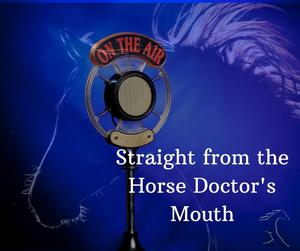 Straight from the Horse Doctor's Mouth
Straight from the Horse Doctor's Mouth
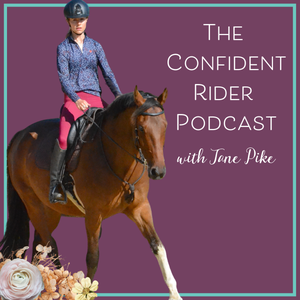 The Confident Rider Podcast
The Confident Rider Podcast
 Feed Room Chemist: An Equine Nutrition Podcast
Feed Room Chemist: An Equine Nutrition Podcast
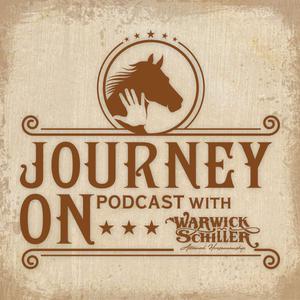 The Journey On Podcast
The Journey On Podcast
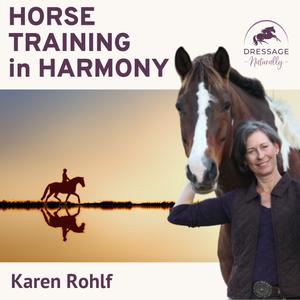 Horse Training in Harmony
Horse Training in Harmony